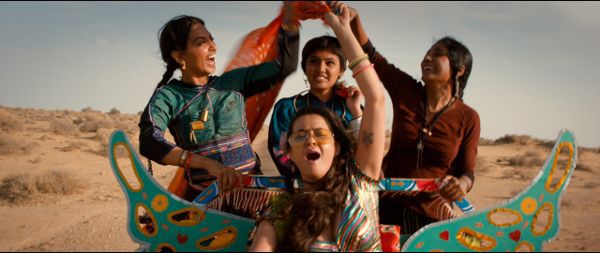 |
| Leena Yadav: 'I definitely didn’t want to make a dark, depressing film about it because I don’t think life is like that and these women that I met were not like that. They celebrated life' |
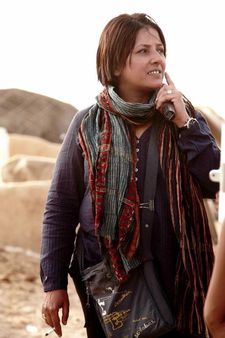 |
| Leena Yadav: 'I’m hoping by the end of the film, people acknowledge that it’s happening in their backyards across the world.' Photo: Courtesy of Wolfe Video |
The origins of the film – which is released on DVD and VOD in the US on August 8 – lay in Yadav’s desire to work with Chatterjee and it was the actress that gave her inspiration, after she related conversations she had had with female villagers while shooting other films.
“They spoke very freely about sex the moment they were only with women,” said Yadav when I caught up with her ahead of the film’s UK premiere at Edinburgh International Film Festival. “So I said: ‘It’s interesting that their conversations about sex are so much more real and honest than us, who think we are more progressive, living in the cities. I think we’re much more guarded.’ So it started off as let’s make, Sex In The Village and take the pants off Sex In The City.”
“But then I started travelling and having conversations with these within and I think there’s a lot going on in the world and these sub-tones came into the film. When I came back to write my first draft, my first revelation was, who am I kidding? The same thing is happening here in Bombay. The circumstances are different and the stories are different, but similar.
“Then when I sent my first draft to my friends across the world, they wrote back more stories from their cultures and their societies. The depressing thing was that I suddenly realised, shit, this problem is not only universal it almost feels eternal. On the surface we keep getting polished and progressive but the same thing is happening in shadows everywhere. So that was the scary part. So, I said: ‘I need to make this film so that I’m hoping that our audience feels very comfortable to watch the beginning – so it’s all happening over there, which is a human tendency – but I’m hoping by the end of the film, people acknowledge that it’s happening in their backyards across the world.”
Yadav is the daughter of an Indian Army general and she says that travelling in the country as a child gave her a curiosity and interest in different stories and cultures.
“It’s like being in different countries. So that is what shaped me as a person,” she said.
The film deals with some difficult issues but Yadav has a lightness of touch that gives her film a slightly fairy tale vibe and stops it from becoming heavy going. She says sometimes “magic” just happens on a film and admits that it wasn’t an intentional move on her part but that the film’s “fable-ish” quality became apparent as she edited the film Kevin Tent.
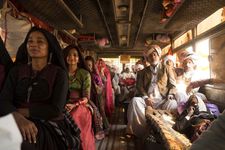 |
| Leena Yadav: 'For me there is no villain, the villain here is conditioning' |
Although this is a female-centric film, focusing in on gender politics that can restrict women’s lives, Yadav is keen to point out that both genders need to take responsibility for moving the situation on. Like Elite Zexer’s Sand Storm – which touches on arranged marriage and similar themes – it is cultural expectation that holds everyone back.
“For me there is no villain, the villain here is conditioning,” said Yadav. “For me, the men also looked like victims when I was writing them. They felt like victims who needed healing. Being a man in that kind of set-up, who needs to be that powerful, potent kind of provider all the time is exhausting. As long as we approach this problem as a gender blame game, I don’t think we’re going to get anywhere. We co-exist, so let’s have an honest conversation. “Even in Western countries, we are so trapped by conditioning, still saying, ‘Boys don’t cry’ and ‘Girls can’t to this’. Even with the most progressive of us, it just slips out. It’s so ingrained. So my quest with this film is just to question everything. To think, why did I say that? Where is it coming from?
“We place so much value on such superficial things. That’s the cycle we have to break. When I was a child growing up, I said: ‘Why do women who went through shit with their mother-in-law become the same mother-in-law.’ Part of it is human psychology of: “I went through it, let them also go through it.” And part of it is: “This has always happened” – without even questioning it. And part of it is just human, not male or female, punishing somebody for what you went through. It’s a lot of things put together.”
The shoot itself was a challenge for Yadav and her team, because she wanted to work on it with the village where they chose to shoot, which caused unexpected problems. “It was tough,” she said. “To start with I wanted to shoot it in Kutch, Gujarat, because that’s where I researched it and that’s where the theme of the parched land got into my head. But I went to numerous villages to scout and ask permission. We always tried to approach the village, saying: ‘We want to come here and shoot for one and a half months, we’d like to employ you and integrate you into this whole process.’ And they would say: ‘So, are more women like you going to come and work on the crew?’ I would say: ‘Yes.’ And they would say: ‘No. Our women will get corrupt looking at you.’ So I actually got rejected from a lot of villages. We ended up having to shoot the film in Rajasthan, which has got a similar landscape.’
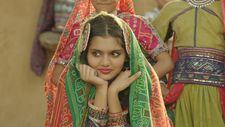 |
| Lehar Khan as Janaki. Leena Yadav: 'I wanted to show that you can’t stop sexual liberation just because you say, ‘You can’t do this’ |
She said: “There were a lot of unemployed male villagers who shifted in when the shoot was happening because they would get free food and stuff. And they would just sit, but every two or three days there was a violent outburst amongst them. They’d start beating each other up in their frustration. That’s how comical it is – it’s just so stupid. It’s just taking violence from somewhere else and exporting it. And that is the violence that comes out on women, they’re carrying their frustrations from the whole day and they come and trash a person who has to take it from them.
“We saw the sexual frustration for real because real villagers were used as extras. All my crew had to become villagers in the dance tent scenes because we had to protect the girls because these men were going for the girls. I saw it for myself, where that sexual violence comes from. So we just need to talk about sex. We need to talk about these things and get it out of our system. This is across cultures.”
The film was also a challenge for the actresses, as it features nudity, with a sexual frisson.
“The actresses had to break personal and professional barriers because none of them had done nudity before,” said Yadav. “So, I approached it as a personal choice first, for the actor even before we talked about anything else. I said: ‘It’s a personal decision. Do you want to explore his or not?’ So that did rule out many people.
“I want the actor to be completely in the skin of the character and psychologically understand the past, present and future of that character so I work a lot on creating a past for them, whether it appears in the film or not. So they are just being in the film, they’re not acting. They understand that person’s psyche and everything else.”
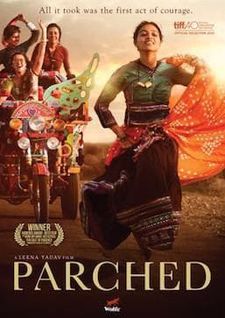 |
| Parched poster |
“I wanted to show that you can’t stop sexual liberation just because you say, ‘You can’t do this’. You have to acknowledge the times we live in, that’s my whole take on censorship.”
Parched will be released via Wolfe Video in the US on August 9 on DVD and VOD, across all digital platforms including iTunes, Vimeo On Demand, and WolfeOnDemand.com, and will also be available same date on DVD via Wolfe Video and many major retailers. No UK release date has yet been scheduled.
Parched from Wolfe Video on Vimeo.





















